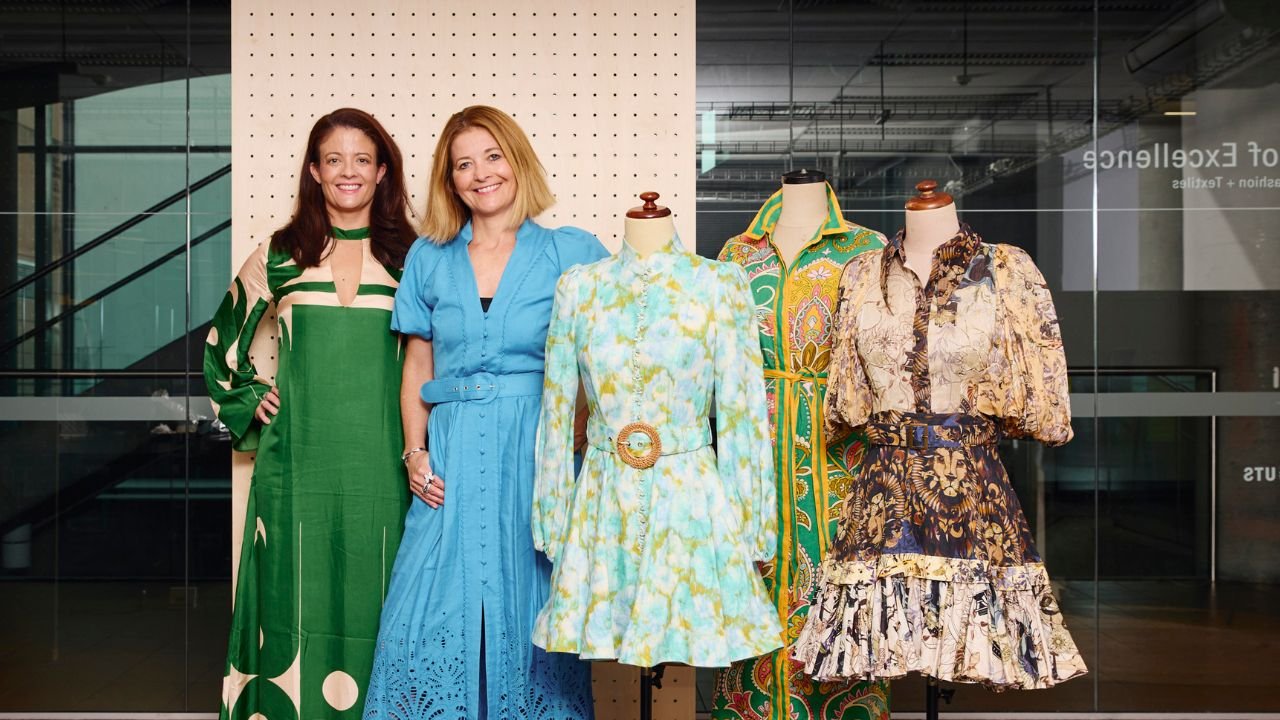The University of Technology Sydney (UTS) and The Volte, the world’s largest peer-to-peer fashion rental site, recently pioneered research into the sustainability of fashion rental. This collaboration sought to shed light on the environmental impact of The Volte’s innovative rental model. Its implications for sustainable fashion practices. And, an understanding as to how the AJE dress fit into the equation…
Utilisation in environmental impact
The research – which involved Kellie Hush, The Volte Creative Director and Strategy and Bernadette Olivier, co-founder and CEO The Volte (in the blue and green dress below, respectively) – underscored the importance of garment utilisation in reducing environmental impact. By analysing data from The Volte, researchers aimed to demonstrate how increased garment use through rental can significantly decrease carbon emissions per wear. Offering a sustainable alternative to traditional ownership.
Among the notable dresses analysed, were the Zimmermann Brightside A Line Mini Dress. Which was rented 39 times for weddings, christenings, work functions, race days, high tea, hens parties and holidays. And, the AJE dress (pictured above). Data relating to the former revealed that by renting, instead of 39 people buying an individual item, it saved the equivalent of 507 trees. Avoiding driving 4403 km in a car (or almost five trips between Sydney and Brisbane). While the benefits of the latter suggested that it saved the equivalent of 259 trees. And, not driving 86,284 km in a car. Or, almost a whopping 100 trips between Sydney and Brisbane!)

High quality fashion v circular economy
The Volte specialises in occasion wear, prioritising high-quality garments over fast fashion. This emphasis on quality not only promotes sustainable consumption but also contributes to a circular fashion economy. CEO and co-founder Bernadette Olivier highlighted The Volte’s role in extending the lifecycle of designer dresses. And, reducing resource consumption and minimising garment disposal rates as a result.
Taking sustainability and style seriously
Dr. Lisa Lake, Director of UTS Centre of Excellence, explained the research methodology, which involves quantitative analysis of various factors. Such as garment materials, production locations, rental distribution and laundering methods. Through interdisciplinary collaboration, including experts from UTS Business School and the Institute for Sustainable Futures (ISF), the research aimed to provide comprehensive insights into the environmental implications of fashion rental.
Education, awareness and environmental impacts
Through their partnership, UTS and The Volte aimed to raise awareness about the environmental benefits of fashion rental. And, educate consumers about sustainable fashion choices. By quantifying the sustainable impact of rental versus ownership, the research collaboration sought to drive informed decision-making. And, promote a more environmentally conscious approach to fashion consumption.
Ultimately, as the fashion industry grapples with sustainability challenges, initiatives like this collaboration can offer valuable insights and practical solutions. By harnessing the power of peer-to-peer fashion rental and promoting high-quality, circular fashion practices, platforms such as The Volte not only promote sustainable fashion practices but also empower consumers to make environmentally conscious decisions. By offering affordable access to designer dresses and enabling individuals to earn income from their closets, The Volte – and similar services – can foster a community-driven approach to sustainability in fashion.





